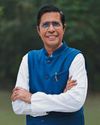
Considering the rising life expectancy and the need for a larger corpus post-retirement, what are your broad thoughts on this matter?
Firstly, I appreciate Outlook for initiating this 40After40 Retirement Expo series. It is very timely, especially considering the increasing life expectancy. The average life span, once around 50 or 60 [years], has now reached 70 and is projected to rise to 74 by 2030 and 78 by 2040, which is not distant at all, just 16 years away. This underscores the significance of your question. If [retirement is] not planned, people can find themselves in a difficult spot.
We are witnessing rapid societal transformations in India and globally moving from traditional large families to nuclear setups and evolving family dynamics. How does this shifting landscape impact retirement planning strategies?
Because of shifts in technology and change in economic conditions, life can be uncertain for the next generation themselves. So, we never know, the next generation may have their own financial and life issues to deal with. Or with increasing global mobility, the next generation, despite best intentions, may not be able to be physically present to help. Also, culture may change over time. This can leave many individuals more financially and mentally vulnerable in their retirement years.
So, how hard can it get?
When I consider the elderly individuals we encounter daily, including our own parents, you can see for yourselves. Compared to their prime years, now they feel lonely; they sometimes feel they are not relevant in the family due to their health issues. Imagine, to add to this, if they have financial issues. To save early and to invest in retirement plans can help [reduce] stress and give security
in old age.
この記事は Outlook Business の March 2024 版に掲載されています。
7 日間の Magzter GOLD 無料トライアルを開始して、何千もの厳選されたプレミアム ストーリー、9,000 以上の雑誌や新聞にアクセスしてください。
すでに購読者です ? サインイン
この記事は Outlook Business の March 2024 版に掲載されています。
7 日間の Magzter GOLD 無料トライアルを開始して、何千もの厳選されたプレミアム ストーリー、9,000 以上の雑誌や新聞にアクセスしてください。
すでに購読者です? サインイン

From Chandni Chowk to Global Recognition
For Manish Aggarwal, director at Bikano, Bikanervala Foods, the family business was not just a responsibility but a passion he took to the global stage

Spotting AI Scams
Al has become an integral part of our lives, from customer service no insurance claims. But it is also becoming a tool for fraudsters who use it to scam individuals and corporations

Let a Hundred Flowers Bloom
On the banks of the Ganges in industrial Kanpur, a start-up has blossomed that turns waste flowers into incense

BATTERY LOW
India produces enough green energy to power many of its largest cities yet lacks the storage to use it efficiently. A nation blazing forward must leap ahead in battery technology to stay on course

We Have Everything Going for Rajasthan
Rajyavardhan Singh Rathore, Rajasthan’s industry and commerce minister, tells Pushpita Dey why the state is suited to become a hub for investments.

Dairy and Other Dilemmas
India’s refusal to open its dairy market has complicated trade negotiations for years. As global partners demand concessions, is the cost of protectionism outweighing benefits?

Riding in a Maze
As gig workers ride into an uncertain future with little more than a smartphone and a bike, the government is struggling to arrange a socialsafety net. But millions without social security is recipe for disaster

BIRLA'S BIGGEST BATTLE
As Kumar Mangalam Birla completes 30 years at the helm of the Aditya Birla Group, he has a battle to defend his businesses and conquer new ones

THE INNOVATION LEAP
India dreams of becoming a product nation. But unless the corporate sector significantly increases spending on R&D, the country will continue to lag behind global peers

EDUCATION BUDGET MUST DOUBLE EVERY 3 YEARS
Veezhinathan Kamakoti, a renowned academic and director of Indian Institute of Technology Madras, tells Deepsekhar Choudhury on what technology sovereignty means for India and how it can propel the country towards its vision of becoming a developed nation by 2047.